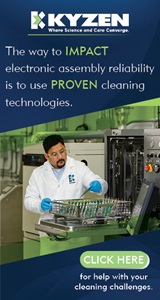|

|
|
| Ask the Experts | |||||||
|
|||||||
|
January 23, 2018 - Updated October 18, 2010 - Originally Posted Conformal Coating Cross ContaminationWe apply 3 different types of conformal coating: Acrylic, Polyurethane and Silicone. We use designated dispensing systems for each, but cure them all in a single oven. We believe we are experiencing cross contamination. If we purchase a second curing oven, which two coatings would be best to cure in the same oven? A. K. |
|||||||
| Expert Panel Responses | |||||||
|
Silicone is certainly the material most likely to cause problems if contaminating other product since it can cause problems with dewetting and adhesion. I would therefore recommend you use one oven for silicone and the other for the acrylic and polyurethane. These two can share an oven with no problems providing you avoid any material physically dripping onto other assemblies.
Principal Engineer - CMA Lab BAE Systems Bryan Kerr has 35 years experience in providing technical support to PEC assembly manufacturing. His experience ranges from analysis of materials and components to troubleshooting and optimizing, selecting reflow, cleaning, coating and other associated processes.
Acrylic and Polyurethane.
President Krayden Inc. Wayne Wagner has over 25 years in the conformal coating industry and is the president of Krayden Inc., a leading distributor of engineered materials.
I would cure the silicone coating LAST and in its own oven. Urethane and acrylic are fine in the same oven...silicones are great materials, but traces can contaminate surfaces beyond our belief!
Chairman Polyonics, Inc. Jim Willimas is a PhD Chemist in Polymers and Materials Science. He specialize in printing, cleaning, inks, and coatings used in electronics manufacturng operations. Williams has more than 30 years experience.
The short answer is, keep the Acrylic and Polyurethane on one line and the Silicone on a dedicated line. Silicone will generally contaminate the board surface causing de-wetting when applying Acrylic and Polyurethane coatings. I would suggest having the silicone line in another room or sealed area ! For information on which coatings to use for specific applications contact your coating supplier.
European Manager HumiSeal Chris Palin is currently managing European sales and support for HumiSeal Conformal Coatings. His expertise is in test & reliability, solder technology, power die attach and conformal coating.
Generally, for conformal coating you shouldn't see defects from cross contamination in the oven from coatings based upon acrylic and polyurethane resins or their hybrids. The problems come with silicone materials. This is due to most coatings not liking to stick to silicone residues so any cross contamination through handling or application could be a problem. If you can avoid mixing silicone conformal coatings with other materials its generally better. Or, develop really good housekeeping and process controls.
Owner SCH Technologies Lee has worked within the conformal coating and electronics industry for over 18 years. His work includes scientific research into long term reliability of electronics, technical sales of conformal coating materials and equipment, owner of SCH Technologies, a conformal coating service in the UK, a member of the Diamond Coating Solutions Group, a global liquid conformal coating and Parylene coating service solutions provider, a founding member of Nexus3c, Conformal Coating Centre and a partner of Thin Film Partners.
|
|||||||
| Submit A Comment | |||||||
|
Comments are reviewed prior to posting. You must include your full name to have your comments posted. We will not post your email address. |
|
Free Newsletter Subscription
Circuitnet is built for professionals who bear the responsibility of looking ahead, imagining the future, and preparing for it. Insert Your Email Address |
|

|






